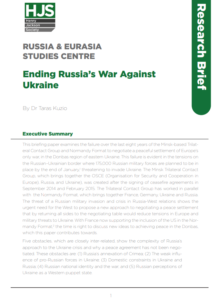 Meeting again tomorrow, the Normandy Format Negotiations, have failed to come to a peaceful conclusion of the conflict in Ukraine, according to a new report published by the Henry Jackson Society.
Meeting again tomorrow, the Normandy Format Negotiations, have failed to come to a peaceful conclusion of the conflict in Ukraine, according to a new report published by the Henry Jackson Society.
The discussions consist of France, Russia, Ukraine and Germany, and was supposed to mediate the Minsk Trilateral Contact Group in the search for peace in the Donbas region. In Ending Russia’s War Against Ukraine, author Taras Kuzio lays out how the current threat to Ukraine’s peace and security is the product of the failure of these negotiations.
The paper argues that Russia’s approach to the conflict and negotiations have derailed any chance of a peace agreement:
- Russia’s Annexation of Crimea – Russia has drawn a hard line since 2014 that the status of Crimea is not up for negotiation. This is despite continued efforts by Ukraine’s President, President Zelenskyy to maintain awareness of the illegal occupation. The Ukrainian people do not accept the exchange of recognising Russian sovereignty over Crimea for peace in the Donbas region.
- Weak Pro-Russian Forces in Ukraine – Both the Minsk Trilateral Group and the Normandy Format ignore the Crimean question, and allow Russia a presence which belies that it is the aggressor and occupying force. 81% of Ukrainians hold a negative view of Putin, any negotiations with him hold little legitimacy in the eyes of the public.
- Domestic Constraints to Peace in Russia and Ukraine – Around 85% of Russians support the Russian ‘reunion’ with Crimea. Whilst only 12% of Ukrainians see Russia as a friendly country. Following 8 years of war there are 400,000 Ukrainian veterans in civil society and participating in protests. These veterans are actively co-opted by political parties for their large constituency base.
- Russian National Identity and the War – In 2021 Putin stated in an article that Russian leaders do not recognise the existence of Ukraine as independent country. Instead Russia views Ukraine as a Little Russian branch of the great pan-Russian nation.
- Russian Perceptions of Ukraine as a US and EU Puppet State – Instead of as an independent, sovereign nation, with its own democratically elected government, Russia sees Ukraine as a puppet for the West and its values. So the war with Ukraine is not only seen as bringing Ukraine back into the Russian fold but as a proxy for war with the West.Whilst Macron calls for an EU response to the crisis, he is – according to Kuzio – moving chairs on the lawn rather than serving the interests of Ukraine and her people. The Normandy Format has been crippled from the beginning by playing into Russia’s hands and leaving out the UK and US. The balance of the talks has been in Russia’s favour, as the terminology, the refusal to discuss Crimea, and that aggressors in the Donbas aren’t Russian proxies have all given it the upper hand.To restore Ukrainian Faith in the Peace process (only 11% support the Normandy Format as it currently stands, whilst 45% would support bringing in the UK and US as members) the paper recommends six actions to be taken.
- Expand the Normandy Format to include the UK and US. As key allies the UK and US should have a seat at the table. This would allow them to counter the Russian narratives around the Donbas and Crimea more robustly, and strengthen Ukraine’s position.
- Repair Damage to EU unity. Given that the EU is not currently united over key Russian issues such as Nord Stream 2, or when to impose sanctions, reorganising the Normandy Format would allow for stronger EU and NATO representation.
- Relocate to a neutral country. Following the breakdown of relations with Belarus, and its clear pro-Russian stance, it is no longer suitable to hold negotiations in Minsk. They should be moved to a neutral country, this would again weaken the Russia’s hand in negotiations.
- Use correct terminology. The Kremlin’s disinformation machine has been successful in defining the Donbas conflict as a civil war, and preventing the situation in Crimea from being described as an illegal occupation. Using the correct terminology would again reduce support for the Russian position.
- Refuse to negotiate with terrorists. The Ukrainian state currently describes Russian proxies in the Donbas as terrorists. In keeping with Western values, there should be no negotiation with terrorists.
- Put Crimea on the table. Ultimately there cannot be a successful negotiation without discussing Crimea. The Donbas and Crimea are two parts of the same conflict, driven by the same forces and causing the same issues. As the illegal coccupation of the Crimea has been condemned by the Un and Ukrainian allies no one at that table should ignore it. In June 2021 a Ukrainian survey found that only 3.2% of people supported peace in the Donbas in exchange for acknowledging Russian sovereignty in Ukraine.


